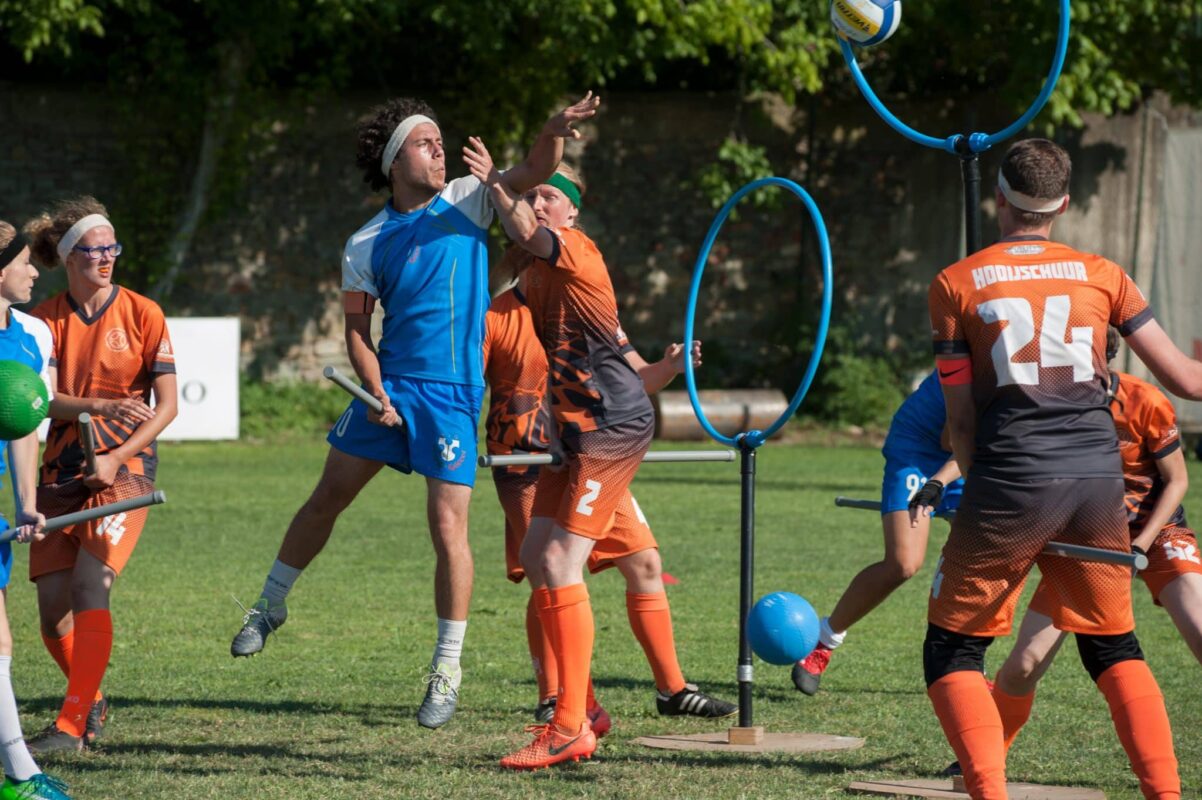According to legend, Rugby School pupil, William Webb Ellis, originated Rugby as a sport when he picked up, and ran with, the ball during a football match. This led to a collection of boarding schools setting formal rules in 1863 and the formation of the Rugby Football Union in 1871. The Webb Ellis Cup is now the trophy awarded to the winning team in the men’s Rugby World cup.
Despite ongoing discussion and debate about ‘the high risks involved with playing Rugby, our research also shows that it is one of the most common sports in schools. We surveyed 288 state-funded secondary schools in England and found that Rugby union was played in 81% of these schools. It is more common for boys to play Rugby, but over half of the schools offered Rugby for girls.”
The England Rugby Football Schools Union (ERFSU), the schools’ arm of the RFU, has around 2,000 member schools, ranging from traditional Rugby playing secondary schools to those new to Rugby.
Indeed, more schools are playing the game than at any time.
Why? Why does a sport known for encompassing inherent dangers of concussion, sprains and dislocations continue to grow in popularity and support from local to international level – with interest often initiated at school?
‘As well as helping to develop sport specific skills and increasing physical activity, we know the positive impact that Rugby can have on life skills and character. Rugby participants in secondary schools report they feel more confident, resilient and have developed in our values of Teamwork, Respect, Enjoyment, Discipline, and Sportsmanship.
‘The joy of muddy tackles and scrums – Rugby is one of the best life-learning environments for pupils,” says Dan Pratt, Director of Sport at Wellington College. “As an invasion-based team game, Rugby teaches skills such as effective communication, strategic leadership and fast, tactical decision-making: for example, what actions to take following penalties. It provides a wonderful environment in which to learn genuinely meaningful transferable skills like resilience, commitment and teamwork. In a world where such skills are being given as much value as subject knowledge, it has a profoundly important place for us as a school… It is also one of only a few games where there is a position for everyone, regardless of height, size and skill set. Some pupils might be strong ball carriers or incredibly fast runners, while others enjoy the contact area and making tackles.”
The Rugby Football Union lists specific benefits of introducing Rugby to young people with a focus on the gains for the players:
• Through core values we can help to develop more confident, capable, creative young people who will be better equipped to succeed in education and in life.
• Joined up approach to avoid overplaying
• Healthy lifestyle – a good way to keep fit
• Further develop Rugby skills and game knowledge
• Playing, coaching, refereeing or volunteering opportunities
• Strong sense of belonging in the club community
• New life lifelong friendships and bonds
…and gains for the school, college, university or other institutions:
• Enhanced PE and sports programme
• More capable, confident developed pupils
• Development for teachers and Rugby staff
• Rugby club events/activities held at institution
• Utilising partner facilities or sharing equipment
• A wide range of volunteering opportunities for students
• Engagement with wider community
• Support from club coaches
BUT…what about those dangers? What about the concern that although Rugby injuries and tackles look painful to spectators, our minds are put at ease as players get back up and continue playing… but these invisible injuries can have devastating consequences for players later in life?
Schools have a duty of care, staff have an invested human interest, and parents have a deep-rooted personal concern to ensure that today’s young players are enabled to enjoy all the benefits of the game with the dangers to future health absolutely minimised.
With all this in mind, The England Rugby Football Schools’ Union seeks
“To promote a structure for the safe and secure organisation and playing of Rugby Union in all schools in England based on the Game’s core values and to further the interests of its members.”
After all, Rugby can be played without tackling and still provide a wide range of physical and mental health benefits that help children stay physically active and maintain psychological wellbeing.
For primary pupils, the concepts and benefits of Rugby can be made totally accessible through TAG Rugby. Almost like an enhancement of the popular, age-old, playground game of ‘It’, TAG Rugby, or adaptations thereof, can be played on basic grounds in any primary playground space and enjoyed by all ages and abilities. There are plenty of resources available to support teachers using this sport to introduce their pupils to the multiple benefits of this interactive, social, team sport.
Moving onto secondary education, non-contact is “an ideal way to introduce young leaders and non-Rugby specialist staff to coaching and officiating in a safe environment. Non-contact can be played in mixed gender teams… XRugby – which can be 5, 7 or 10-a-side and played on half a pitch – has adapted rules for the scrum, tackle, ruck and maul to reduce the intensity of contact and make it simpler to teach. By changing numbers and pitch space, teachers are able to make XRugby suitable for all students wishing to play contact Rugby – but it should be only taught by suitability-qualified individuals who have completed the “Headcase” concussion module.”
Schools can also look at offering Rugby as an option, rather than a compulsory part of the sports curriculum.
‘Surely, this way round, everyone is happy. Those who wish to play Rugby – those who feel they have the potential, and the desire, to make a career out of it, or who just enjoy it as a sport, and are content with taking the risks associated for themselves – can. Those who don’t wish to play – and let’s face it, those in the U14E team are hardly likely to make a career out of the game – don’t have to. They can do something more suited to their strengths, but can still be encouraged to play as a team, and to improve their fitness.
There is no doubt that offering Rugby has advantages for all schools, pupils and students – primary and secondary, state or private – and that careful consideration and risk assessment can mitigate the risks to enhance the benefits.
“Rugby is being taken into 750 state secondary schools with the aim of making school life happier and healthier, reducing anti-social behaviour, enhancing learning and increasing self-esteem for students. In partnership with the Rugby Football Foundation we will create a positive legacy for one million children through Rugby and its core values.”





